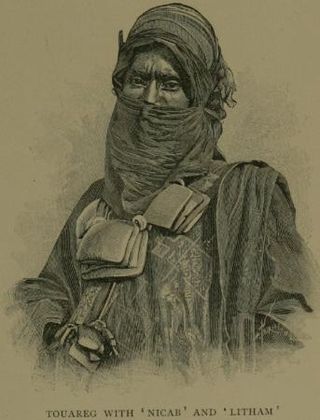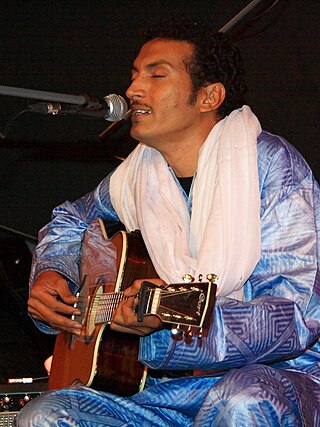Related Research Articles

The Azawakh is a breed of dog from West Africa. With ancient origins, it is raised throughout the Sahelian zone of Mali, Niger, and Burkina Faso. This region includes the Azawagh Valley for which the breed is named. While commonly associated with the nomadic Tuareg people, they are also bred and owned by other ethnic groups such as the Peulh, Bella, and Hausa. The Azawakh is more related to the Sloughi than it is to the Saluki.

Burkina Faso is a landlocked country in West Africa with an area of 274,200 km2 (105,900 sq mi), bordered by Mali to the northwest, Niger to the northeast, Benin to the southeast, Togo and Ghana to the south, and Ivory Coast to the southwest. As of 2021, the country had an estimated population of 20,321,378. Previously called Republic of Upper Volta (1958–1984), it was renamed Burkina Faso by President Thomas Sankara. Its citizens are known as Burkinabè, and its capital and largest city is Ouagadougou. Its name is often translated into English as the "Land of Honest Men".

Burkina Faso's 22.1 million people belong to two major West African cultural groups: the Gur (Voltaic) and the Mandé. The Voltaic are far more numerous and include the Mossi, who make up about one-half of the population. The Mossi claim descent from warriors who migrated to present-day Burkina Faso and established an empire that lasted more than 800 years. Predominantly farmers, the Mossi are still bound by the traditions of the Mogho Naba, who hold court in Ouagadougou.

Burkina Faso has good relations with the European Union, African and certain Asian countries. France, the former colonial power, in particular, continues to provide significant aid and supports Compaoré's developing role as a regional powerbroker.

The Tuareg languages constitute a group of closely related Berber languages and dialects. They are spoken by the Tuareg Berbers in large parts of Mali, Niger, Algeria, Libya and Burkina Faso, with a few speakers, the Kinnin, in Chad.

Blaise Compaoré is a Burkinabé-Ivorian former politician who served as the second president of Burkina Faso from 1987 to 2014. He was a close associate of the first president, Thomas Sankara, during the 1980s, and in October 1987, he led a coup d'état during which Sankara was killed. Subsequently, he introduced a policy of 'rectification', overturning the leftist and Third Worldist policies pursued by Sankara. He won elections in 1991, 1998, 2005 and 2010, in what were considered unfair circumstances. His attempt to amend the constitution to extend his 27-year term caused the 2014 Burkinabé uprising. On 31 October 2014, Compaoré resigned, whereupon he fled to the Ivory Coast. In April 2022, he was found guilty by a special military tribunal of complicity in Sankara’s murder. He is also the longest serving president of Burkina Faso.
Burkinabè Fulfulde: Burkinabè) may refer to:

Gorom-Gorom is a town in northern Burkina Faso. Its name translates as "you sit down, (and) we'll sit down", reminiscent of its role as an important crossroads in the Sahel. It is the capital of Oudalan Province.

Tillabéri is one of the eight Regions of Niger; the capital of the Region is Tillabéri. Tillabéri Region was created in 1992, when Niamey Region was split, with Niamey and its immediate hinterland becoming a new capital district enclaved within Tillabéri Region.

The Gao Region is a region in northeastern Mali. The capital city is Gao.

The Iwellemmedan (Iwəlləmədǎn), also spelled Iullemmeden, Aulliminden, Ouilliminden, Lullemmeden, and Iwellemmeden, are one of the seven major Tuareg tribal or clan confederations. Their communities are historically nomadic and intermixed with other ethnic groups. The Iwellemmeden inhabit a wide area ranging from east and north central Mali, through the Azawagh valley, into northwestern Niger and south into northern Nigeria. While once a single confederation of dozens of Tuareg clans, subject peoples, and allied groups, since the 18th century they have been divided into Kel Ataram (west) and Kel Dinnik (east) confederations. Following colonial rule and independence, the Iwellemmedan homelands cross the Mali/Niger border, and their traditional seasonal migration routes have spread Iwellemmedan communities into Burkina Faso and Nigeria as well. They speak the Tawellemmet variant of the Tamasheq language, although some current or historical sub-clans speak other Tamasheq variants as well as Songhai languages and Arabic dialects.

Dori is a town in northeastern Burkina Faso, near the border of Niger. It is located at around 14.03°N 0.03°W. It is the capital of Sahel Region and has a population of 46,512 (2019). The main ethnic group is the Fula (Fulani) but Tuaregs, Songhai, and Hausa people are often present. It is a town known for its herders and popular livestock markets.
The Berber Latin alphabet is the version of the Latin alphabet used to write the Berber languages. It was adopted in the 19th century, using varieties of letters.

Tishoumaren or assouf, internationally known as desert blues, is a style of music from the Sahara region of northern and west Africa. Critics describe the music as a fusion of blues and rock music with Tuareg, Malian or North African music. Various other terms are used to describe it including desert rock, Saharan rock, Takamba, Mali blues, Tuareg rock or simply "guitar music". The style has been pioneered by Tuareg musicians in the Sahara region, particularly in Mali, Niger, Libya, Western Sahara, Algeria, Burkina Faso and others.
Bankilaré is a village and rural commune in Niger. Bankilaré commune, centered on the town of the same name, is in Téra Department, Tillabéri Region, in the northwestern corner of the country. The town lies 60 km north of Departmental capital Téra, and around the same distance from the Burkina Faso border and the Mali border.

Omara "Bombino" Moctar is a Tuareg singer-songwriter and guitarist from Niger. His music is sung in Tamasheq and often addresses Tuareg geopolitical concerns. Bombino is the subject of the documentary film Agadez, the Music and the Rebellion.
Tamashek or Tamasheq is a variety of Tuareg, a Berber macro-language widely spoken by nomadic tribes across North Africa in Algeria, Mali, Niger, and Burkina Faso. Tamasheq is one of the three main varieties of Tuareg, the others being Tamajaq and Tamahaq.
Jean Fiacre Kouamé Botué is a professional footballer who plays as a forward for Ligue 2 club Ajaccio. Born in the Ivory Coast, he plays for the Burkina Faso national team.

An Islamist insurgency has been ongoing in the Sahel region of West Africa since the 2011 Arab Spring. In particular, the intensive conflict in the three countries of Mali, Niger and Burkina Faso has been referred to as the Sahel War.
Events in the year 2023 in Mali.
References
- 1 2 Salem Chaker, "Langue et littérature berbères", Clio.fr (2004)